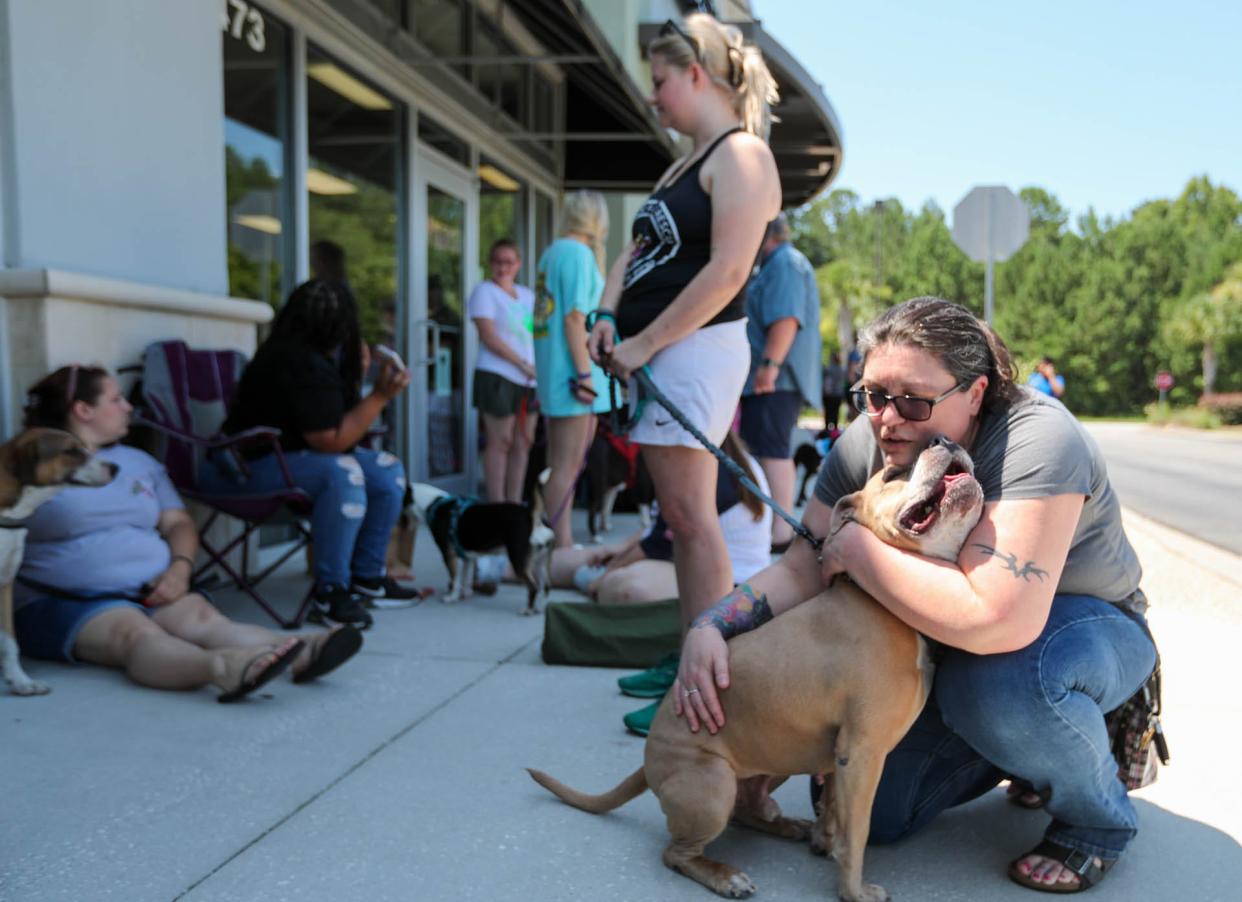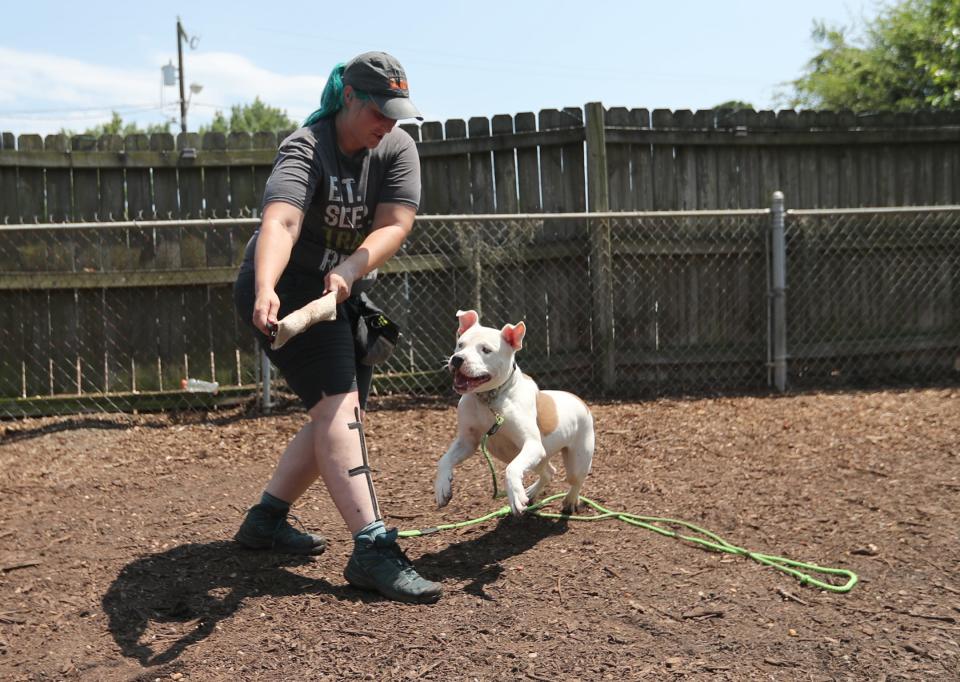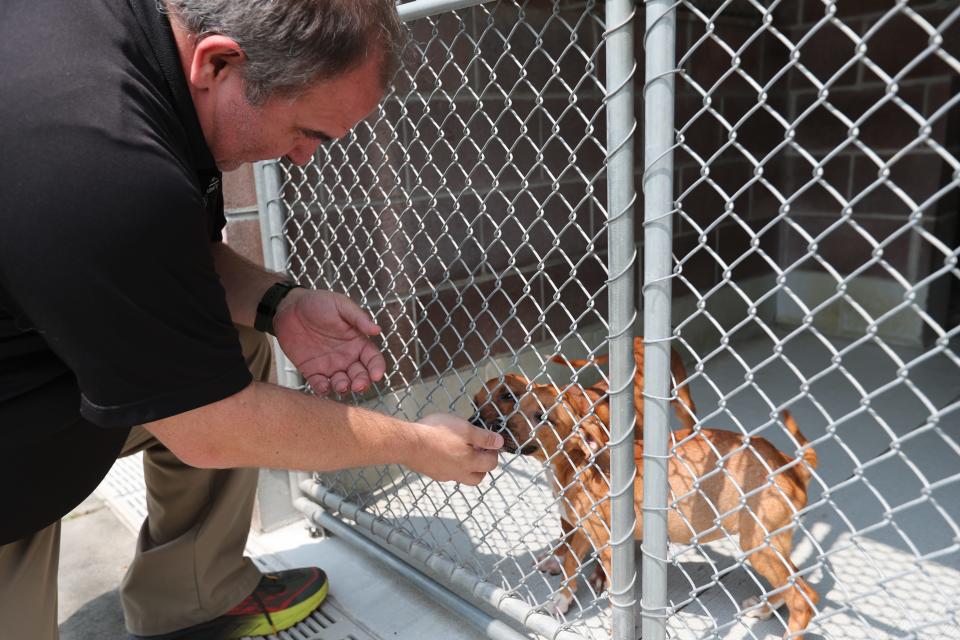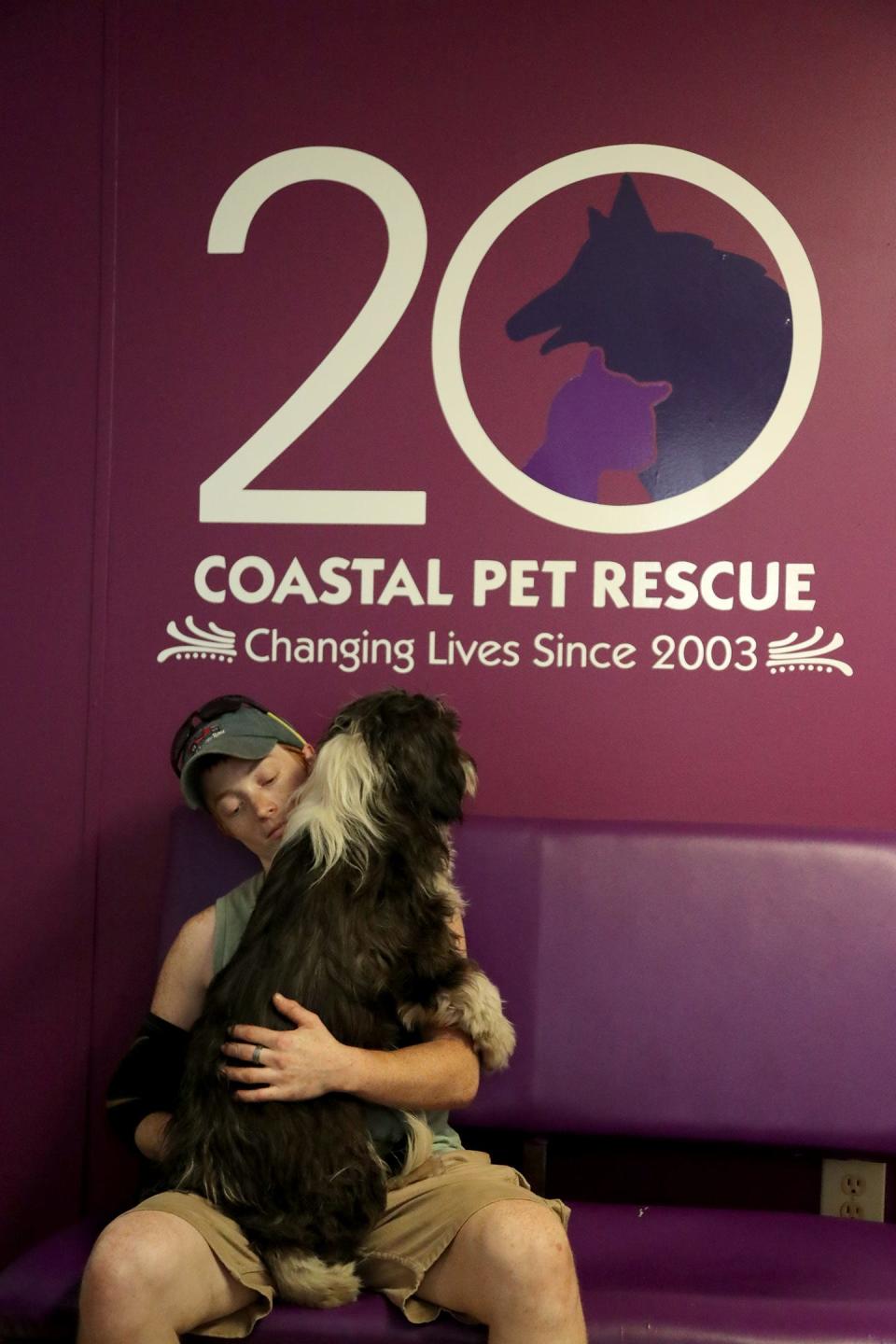Chatham County's animal rescue organizations stretched beyond available resources

Editor's Note: Because of a discrepancy between numbers reported by Chatham County Animal Services and numbers reported to the Georgia Department of Agriculture, Savannah Morning News reported incorrect numbers for intakes and live-release rates at Animal Services. Those numbers have been corrected.
If you talk with anyone in animal rescue, you are going to hear the same story. Too many dogs, not enough room. During a recent adoption event, eager foster families lined up like hawkers at a street bazaar excited to tell you all about their rescue. Tails wagged and tongues panted as playful puppies and excited adult dogs awaited someone to take them to their forever home. More than 20 dogs were at the Renegade Paws Rescue event, and that was just a fraction of the 460 dogs they currently have in their care.
“So we are very lucky. We get a lot of fosters…but then we got the building, so that was like a big thing,” said Co-founder and Renegade Paws Director Jennifer Taylor.
Through generous donations over the past couple of years, Renegade Paws has been able to move from a 500-square-foot office space into a building that was once a pet boarding facility, already equipped with more than 40 kennels, on Ogeechee Road.
“I wish we didn't have to buy a place like that,” said Taylor “...like I wish animal welfare wasn't at the point where, even with this place, we have to say no. Literally every day they call us, they text us…they ask, ‘please help; please help us out’.”
Despite having more than 300 volunteers fostering dogs, nearly every kennel at Renegade Paws Rescue is full and they have had to create extra space to accommodate a recent influx of puppies. This isn't just a Renegade Paws issue. No matter where you go throughout the area, the story is the same.

Fur Babies: Wag-O-Ween, Savannah's furriest and cutest fundraiser, is wagging its tail around town
No Place to Go: As inflation and housing costs soar, so does overcrowding in Savannah's dog shelters
Pandemic, inflation, affordable housing contribute to animal surrenders
A variety of factors have combined to create a post-pandemic boom of surrendered dogs.
Taylor believes that part of the reason may be missed vet appointments during COVID. “So, like, all of those dogs and cats didn't get spayed or neutered. And then, people just kind of went on about their merry way and didn’t even think about it. So, now we have these accidental litters of puppies coming out and growing up.”
A lack of socialization and training may also be a factor, but the breed of dog is a major issue. Here in Savannah, the most common breed is a pit bull or pit bull mix.
According to Chatham County Animal Services Director Charles Harper, DVM, "That's the big one. Those are the dogs that people don't tend to adopt, you know, they adopt cute little fluffy dogs."
A lot of the dogs are also on the larger size at 40-60 pounds, but many are young ranging from 2-5 years old. Harper thinks "a lot of people get dogs, they have them for a year or so and can't do anything with them, and they have to turn them over."
The situation has intensified over the past few years and now has reached a crisis level. This year marks the twentieth anniversary of Coastal Pet Rescue, and for Founder and Director Lisa Scarborough, it has been one of her most difficult. Everyday she fields 10-20 requests for intakes. Scarborough believes it’s because of the economy.
“Animal control exists to protect the public from dangerous animals. They turned, over time, into an animal welfare agency that has been trying to help get animals adopted that keep showing up there because of the irresponsibility of the community.”
Lisa Scarborough, founder and director, Coastal Pet Rescue
“People are moving because they need a better paying job or their job closed. If you look around, there's a lot of businesses that closed in the last year around here. A lot of small businesses didn't make it. The majority of requests everyday are people who are moving and say they can’t take the animals with me where I’m going.”
That sentiment is echoed by Harper: "Owner surrenders have increased. I think that's the economy and people can't keep these dogs. Between rent going up, pet fees going up... There's a pet fee now that they charge, which is basically a percentage of your rent that they add on to have a pet in the house, which can increase rent 5, 10% a month. If you're worried about your finances, then the dog has to go."

Number of strays on the rise
Another big issue is the large number of strays in the area. According to statistics obtained from the Georgia Department of Agriculture, Chatham County Animal Services has taken in an average of 87 stray or at-large dogs per month over the past four years.
Scarborough said, “Animal control exists to protect the public from dangerous animals. They turned, over time, into an animal welfare agency that has been trying to help get animals adopted that keep showing up there because of the irresponsibility of the community.”
Although Animal Services accepts approximately 144 dogs per month, the majority do leave through adoption, reunification with their owners, or transfer to a rescue agency. Even though Chatham County currently has around a 70% live-release rate, a number of dogs are euthanized each month to create space for more intakes. That number has continued to increase since 2020 and currently sits at around 48 dogs per month for 2023.
Animal Services considers several factors before dogs are euthanized. First and foremost is space. While the facility on Sallie Mood Road has 106 kennels, the agency takes in about five dogs per day ― up to 15 at one time during an extreme seizure case.
"We need 12 runs open; we have four," said Harper. "Then, we go back to all the dogs that we have. Okay, does this dog have aggression problems? Are these dogs going to be adaptable? Are we comfortable adopting these dogs?
"It's a tough decision [to euthanize]. And I think over the last five years, we've really advanced the way we make that decision. And the people here work really hard to network the dogs as much as possible before the decision's made."

'Never-ending battle'
Rescue groups such as Renegade Paws do all it can to relieve the pressure on Animal Services.
“On Friday, they [Chatham County Animal Services] were going to euthanize a bunch of dogs, and they called us and we were able to save one. And Wednesday, they're going to euthanize a mom and eight puppies and probably 10 more because those puppies are taking up one kennel. So, they euthanize all eight of those puppies. It's just one kennel for another dog that'll be there probably 10 minutes after they're finished,” said Taylor.
It’s a never-ending battle that wears on those working to rescue as many dogs and cats as possible. After an exceptionally trying day, Scarborough sat with a pair of volunteers on the hallway floor at Coastal Pet Rescue and ate popsicles as they cried from the overwhelming challenges.
“There's a reason that the industry we're in has a high suicide rate,” said Scarborough. “I would love to be able to save them all. The reality is, we can't. There is no way to do it. And, you know, people get upset that Animal Control euthanizes. Well, what do you expect them to do? They didn't create this problem.”
Taylor surmised a major part of the issue is the lack of spay and neuter laws in Georgia.
“So, the South is really bad because there's just no spay and neuter laws. Twenty years ago in Maine, they made a spay-neuter law. Guess what? They don't have stray dogs.”
But Taylor conceded that while adopting a local or state spay-neuter law may be the answer, it's not going to be an instant cure. “Spay and neuter is kind of like planting a tree. Eventually we're going to see the fruits of that tree in 20 years where we don't have so many animals. But we can spay and neuter the whole damn city right now and we'll still have the same animals, because we have to catch up with what's been done.”
Pet Rescue Organizations
If you'd like to donate, volunteer, foster or adopt, contact these pet rescue organizations in our community:
Chatham County Animal Services, animalservices.chathamcountyga.gov, 912-652-6575
Coastal Pet Rescue, coastalpetrescue.org, 912-228-3538
Grrr Georgia Rescue and Rehabilitation, grrrsavesdogs.org, 912-421-9270
Humane Society for Greater Savannah, humanesocietysav.org, 912-354-9515
One Love Animal Rescue, oneloveanimalrescue.com
Renegade Paws Rescue, renegadepawsrescue.org
Save A Life Inc., savealifepets.org, 912-598-7729
This article originally appeared on Savannah Morning News: Savannah's animal rescue organizations stretched to their limits

